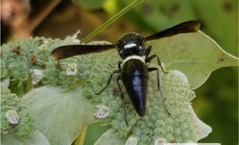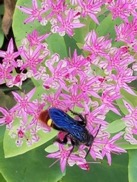Bees have such a great reputation. They are the face of pollinator conservation and we know how valuable they are in our food system. But what about wasps? Where is the love? Wasps are also fascinating pollinators. Did you know that wasps are the main pollinators of figs?
Your garden is full of beneficial wasps. They dine on the pollen and nectar provided in pollinator gardens and are valuable pollinators. They also assist in controlling grubs, caterpillars, and crickets. Wasps provide important garden services!
Sadly, wasps seem to have a bad reputation. They are seen as aggressive stingers. This is not necessarily true. Most wasps are nonaggressive and will only sting when they are grabbed or threatened. These insects are beautiful and fun to watch.

One example of a wasp you may see in your garden this summer is the four toothed mason wasp. This wasp visits all types of flowers. They are cavity nesters, laying eggs in small cavities already created by another wasp or bee. They also use holes in twigs or hollow flower stems. If you have a native bee home in your garden you probably have a mason wasp or two using those homes.
The female wasp hunts for soft-bodied caterpillars to carry back to the nest. She will lay an egg and leave a stunned caterpillar next to that egg. As the egg hatches, the emerging wasp larvae will consume the caterpillar. This is a great service to your garden as you battle caterpillars that eat your food crops.
However, mason wasps do not differentiate between pest caterpillars and the caterpillars of beloved butterflies. Gardeners do have a bit of control here. Plant milkweed, parsley and other butterfly larval plants away from plants that wasps frequently visit such as mountain mint. Otherwise, think of your garden as a whole ecospace and thank the wasps for their help in controlling the pests!

Another valuable wasp is the Scoliid wasp (Scolia dubia). This wasp lives in the soil. The adults can be seen on several flowering plants eating pollen and nectar. The females lay their eggs in the ground. At egg-laying time she will fly just above the ground looking for grubs. When one unlucky grub is spotted, the wasp paralyzes it by stinging. This grub is left with her eggs for the emerging larva to consume. Grub control is another valuable service the wasps provide.
As wasps begin to appear in your garden take some time to appreciate their beauty and the services they provide. Consider becoming more involved with pollinators by participating in the Great Georgia Pollinator Census in August (https://GGaPC.org).
- Are you ready for Pepper Palooza? - July 5, 2023
- The Apple Crunch - September 15, 2022
- Spinach to Win It – 2022 Farm to School Campaign - July 22, 2022